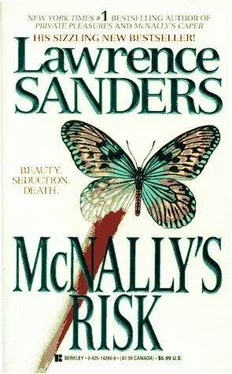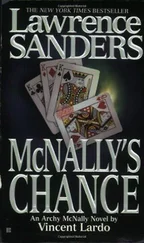Lawrence Sanders - McNally's risk
Здесь есть возможность читать онлайн «Lawrence Sanders - McNally's risk» весь текст электронной книги совершенно бесплатно (целиком полную версию без сокращений). В некоторых случаях можно слушать аудио, скачать через торрент в формате fb2 и присутствует краткое содержание. Жанр: Боевик, на английском языке. Описание произведения, (предисловие) а так же отзывы посетителей доступны на портале библиотеки ЛибКат.
- Название:McNally's risk
- Автор:
- Жанр:
- Год:неизвестен
- ISBN:нет данных
- Рейтинг книги:4 / 5. Голосов: 1
-
Избранное:Добавить в избранное
- Отзывы:
-
Ваша оценка:
- 80
- 1
- 2
- 3
- 4
- 5
McNally's risk: краткое содержание, описание и аннотация
Предлагаем к чтению аннотацию, описание, краткое содержание или предисловие (зависит от того, что написал сам автор книги «McNally's risk»). Если вы не нашли необходимую информацию о книге — напишите в комментариях, мы постараемся отыскать её.
McNally's risk — читать онлайн бесплатно полную книгу (весь текст) целиком
Ниже представлен текст книги, разбитый по страницам. Система сохранения места последней прочитанной страницы, позволяет с удобством читать онлайн бесплатно книгу «McNally's risk», без необходимости каждый раз заново искать на чём Вы остановились. Поставьте закладку, и сможете в любой момент перейти на страницу, на которой закончили чтение.
Интервал:
Закладка:
"Archy McNally, ma'am," I said. "I want to offer the condolences of my parents and myself on your stepdaughter's tragic death."
But she wasn't listening. She was staring at the plant I was carrying and I thought she brightened.
"Glads," she said.
"No, Mrs. Hawkin. It's a Fiesta begonia."
"The red flowers," she said. "My mother always had fresh glads in the house. She went to the market every three days. All colors but mostly she liked red. So cheerful. I should have bought fresh glads every three days."
"May I come in?" I asked.
She allowed me to enter and watched while I carefully placed the plant on a glass-topped end table. Then she came forward to touch the rosettes tenderly. It was a caress.
"So lovely," she murmured. "So lovely."
I feared she had been sleeping and I had awakened her. She was wearing a wrinkled robe of stained foulard silk. Her hair was unbrushed and looked as if it needed a good wash. Her makeup was smeary, the polish on her fingernails chipped and peeling.
"Mrs. Hawkin," I said, "is there anything I can do for you?"
"Do?" she asked, seemingly bewildered.
I looked around the littered room. Overflowing ashtrays. A spilled drink. A tilted lamp shade. Newspapers scattered on the floor. An odor of grease and mildew. Total disarray.
"Perhaps a cleaning woman," I suggested. "I can find someone for you."
Unexpectedly she flared. "Everyone is always picking on me," she howled.
"Picking?" I said, and then realized she meant hassling. "I didn't wish to upset you, ma'am, and I apologize. Would you like me to leave?"
She calmed as abruptly as she had exploded. "No, no," she said, then added coquettishly, "Sit thee down, lad, and I'll get us a nice drinkie-poo."
I should have declined, of course, but at the moment a drinkie-poo was exactly what I needed. Unfortunately, Mrs. Hawkin returned from the kitchen with two tumblers filled with a clear liquid. After a cautious sip I discovered it was warm gin.
"Have the reporters been bothering you?" I asked.
"Everyone," she said. "Everyone's been bothering me. Reporters, policemen, photographers, friends, strangers who park outside to stare at the house."
"Awful," I said.
"I can't stand it!" she shrieked. She threw her filled tumbler away from her. The contents spilled, the glass bounced on the shag rug without breaking. Then she fell to wailing, face buried in her hands.
Shaken, I did what I could to clean up the mess. Then I went into the kitchen, a pigsty. I poured about a quarter of my gin into a reasonably clean glass and added ice and water. I made another like it for Louise and brought it to her.
She had stopped keening. "Thanks," she said huskily and gulped down half. "I don't know what's happening to me."
"You've been through a horror," I told her. "First your husband, then your stepdaughter. It would shatter anyone. It's amazing that you're coping as well as you are."
She stared at me blankly. "Coping? Is that what I'm doing?"
I nodded.
"I'm not," she said. "I'm dead. I can't feel anything anymore."
I didn't believe that for a minute. I saw that strong, determined face sagging and the heavy body gone limp. Sorrow was taking its toll; she seemed to be shrinking. But there was something else in her expression besides grief. Something I could not immediately identify that I had recently seen and could not recall.
"Mrs. Hawkin," I said, "don't you think it might be wise to ask Jane Folsby to come back to take care of you and the house?"
"No," she said at once. "Not her. She knows too much and might talk."
Then I knew Mrs. Folsby had been telling the truth but I feigned ignorance. "Knows too much?" I repeated. "About what?"
"Things," Louise Hawkin said darkly. She finished her drink and held the empty glass out to me. Obediently I returned to that smelly kitchen, realizing I was no better than Hector Johnson. But if I didn't fetch her lethe she'd get it herself. Still…
I sat across from her, leaning forward, intent on keeping up with her fleeting moods.
"Mrs. Hawkin, I don't know if you're aware of it, but I met with Marcia the afternoon before she died."
I saw her stiffen. "Did you?" she said. "What did you talk about?"
"It was a rather disjointed conversation. I didn't clearly understand it. She was obviously disturbed."
"Marcia was insane!" she said forcibly. "I wanted her to get help but she wouldn't. What did she say?"
"Something about a business deal she was planning. Very vague."
"Oh that!" she said, and her laugh was tinny. "Marcia had mad dreams. She thought Hector Johnson would lend her enough money so she could get her own apartment."
"Oh, that's what it was all about," I said. I relaxed, sat back, crossed my legs. "So I guess it was Hector she was going to visit after she left me."
Then that expression I had previously been unable to identify returned more strongly and I recognized it. It was fear, and the last time I had seen it was during my talk with Pinky Schatz in Lauderdale.
"It might have been," Mrs. Hawkin said, shrugging. "It's not important."
"Of course not," I agreed. "That's police business, not mine."
She responded hotly. "Police business? What do you mean by that?"
"Why naturally they'll be trying to trace Marcia's movements the night she was killed. I suppose they'll be talking to all her friends."
She looked at me. "Marcia didn't have any friends," she said flatly.
That might have been true but it struck me as a cruel thing to say. I remembered that poor waif telling me that I was her best friend.
I finished my drink and rose. "I think I better run along," I said. "Thank you for your hospitality and I hope-"
"No," she said. "Stay."
"I'd like to," I said. "I really would. But I promised my parents to accompany them to a croquet match."
"Too bad," she said. "I hate to be alone, and Heck's gone somewhere for the day."
"Why don't you call Theodosia to come over and keep you company."
"That bitch?" Louise Hawkin said tonelessly. "I'd rather be alone."
I could not reply to that so I made my adieu and departed.
"Thanks for the glads," she called after me.
I drove home slowly, trying to nuzzle things out. My visit to Louise Hawkin had been planned as an ostensible sympathy call, but, as I had hoped it, had turned out to be more than that. Nothing conclusive had been learned, you understand, but I was beginning to see things more distinctly-as I'm sure you are also, for I have faith in your perspicacity.
It was during a long, lazy ocean swim that I realized my seam's risks, initially treated with sangfroid, could very well prove to be heavier than I had first calculated. They might, in fact, endanger the physical well-being of your humble correspondent. In spite of what I had heard from Mrs. Hawkin I had no intention of abandoning my cunning scheme, but now I recognized its dangers. I am not, I trust, a craven coward, but neither do I claim to be Dudley Doright.
The perils of what I planned disturbed me. If I should, by evil chance, suddenly be rendered defunct, what I knew and what I suspected would be sponged forevermore. I decided to insure against that unhappy possibility.
During the family cocktail hour I confessed to the mater I had purloined one of her beloved begonias and had given it to the bereaved Louise Hawkin.
Mother beamed, kissed me, and said, "That was sweet of you, Archy."
It was indicative of my mood that a bit of wisdom-"A good deed never goes unpunished."-popped into my mind.
"Father," I said, "could you spare me a few minutes after dinner?"
"How many minutes?" he demanded. He can be something of a martinet at times.
"Fifteen," I said, knowing it would be thirty and possibly more.
Читать дальшеИнтервал:
Закладка:
Похожие книги на «McNally's risk»
Представляем Вашему вниманию похожие книги на «McNally's risk» списком для выбора. Мы отобрали схожую по названию и смыслу литературу в надежде предоставить читателям больше вариантов отыскать новые, интересные, ещё непрочитанные произведения.
Обсуждение, отзывы о книге «McNally's risk» и просто собственные мнения читателей. Оставьте ваши комментарии, напишите, что Вы думаете о произведении, его смысле или главных героях. Укажите что конкретно понравилось, а что нет, и почему Вы так считаете.












